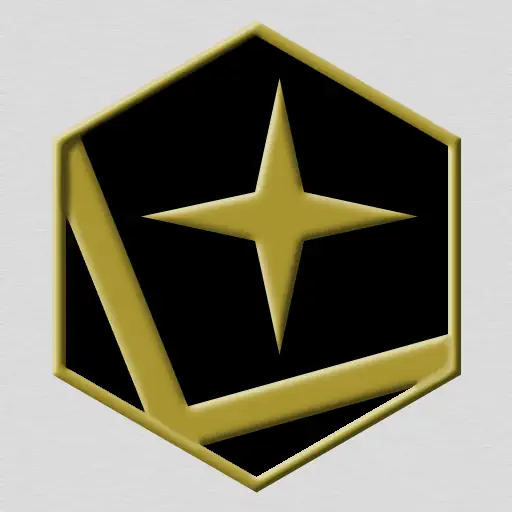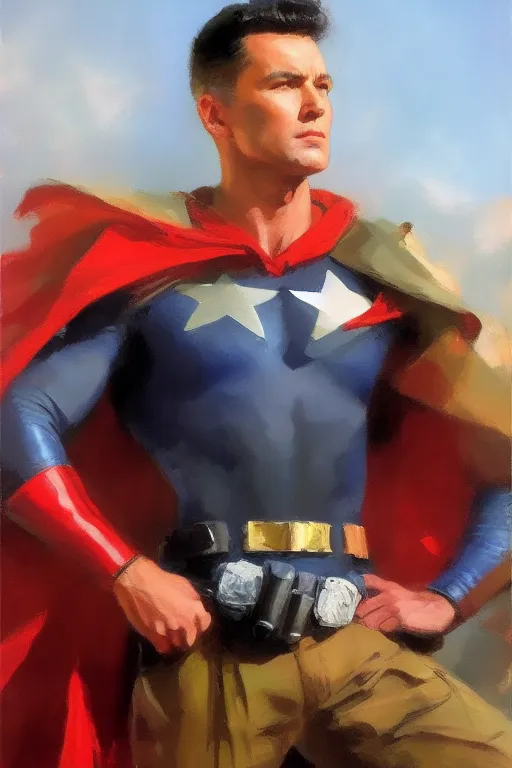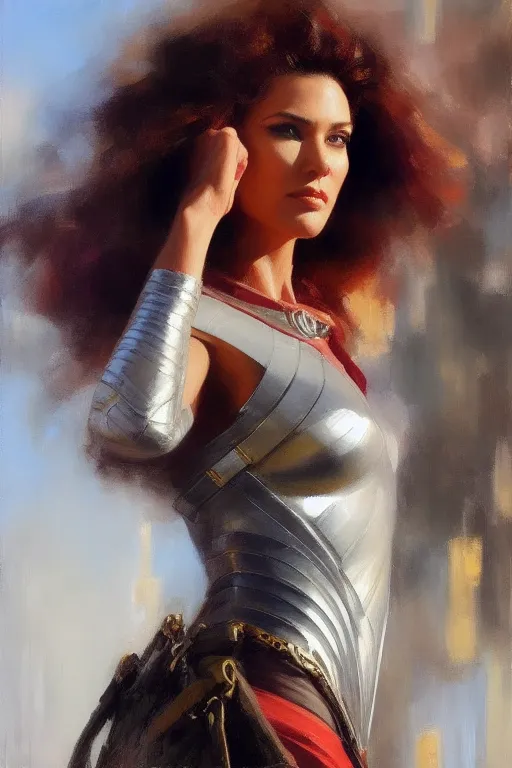
Worshippers, Clergy, Temples | Dogma | Appearance | Relationships & History | Related Images
Khristos is a former mortal who obtained the divine mantle of the Old God of Nature when the Old God was killed by Lord Irus at the end of the Irisian War. Khristos accended to divinity, but did not obtain the god's power or knowledge, which were instead absorbed by the Kami. The Kami, now self aware, were charged by the surviving Old Gods to teach Khristos the ways of divinity and ensure he grew into his role that he could restore Eyom to the way it was before the Irisian War. They have largely failed to teach Khristos anything, treating him as an infant despite his status as a now 2500 year old archmage. He is largely confined to Divheim, forbidden to use his divine powers for everyone's safety, and given no say in the what the Court does to the world.
Khristos is many things, a god in training, an immortal wizard, a friend to all who live in peace, but he is absolutely not the "masked" vigilante Captain Dawnstar. The Good Captain is a seemingly immortal costumed crusaders for peace and justice who is, and we can't stress this enough, not Lord Khristos. Even though he looks, sounds, and acts exactly like him.
Captain Dawnstar is the leader of the Legion of Champions, Eyom's premiere team of costumed champions.
Separately, Heroes like Captain Dawnstar, the Platinum Drake, Sunspot, Freefall, and Felgolos are the greatest defenders of truth and justice the world has ever known. Collectively, however, they are a force of nature, leaders of a team of heroes who are only rivaled by the other various gods of Eyom—the Legion of Champions. The Legion is Eyom’s first line of defense against threats too large for mortalkind to face alone.
For decades, the Legion of Champions has saved the people from the worst threats they have faced; from alien warlords to ancient demons and powerful sorcerers, to Irus himself that one time, and living curses. And every time, they have overcome the odds and saved the day.
The Legion is open to any who wish to join it, and is certainly not led by Lord Khristos and several of his friends who happen to be metallic dragons.
"I once thought I could protect the world by myself. But I was wrong. Working together, we saved Undermountain, and I believe that if we stay together as a team, we could be a force that could truly work for the ideals of peace and justice."
"What, like a bunch of... Super friends?"
"Old Gods, no! We are not calling ourselves that. I was thinking more of a... League of Champions!"
"That's even more corny."
"I'm a god and you're not."
"Could we at least go with the Legion of Champions?"
"That's way better. We're totally going with that."
- Absolutely Not Lord Khristos and Felgolos the Bronze
Worshippers, Clergy, Temples
Although the Legion of Champions is not the world’s first superhero team, it is nevertheless the standard by which all other superhero teams are measured. While the Legion has gone through several permutations over the years, and has broken up and gotten back together countless times, when the chips are down and Eyom needs its greatest heroes back together on the front lines, the Legion always answers the call to duty.
This is due to the Legion's greatest strength, their inspirational feats and nature. The Legion has an endless trickle of new recruits coming to its watchtowers every year. They provide training, support, and assistance for all newcomers who wish to dedicate their lives to doing the right thing.
In the past, the Legion was not seen as a religion, but merely as a simple organization. This view has been shattered over the thousand years of its semi-continuous operation. While there are many adventuring guilds, and many other organizations of civilians dedicated to protecting their fellow civilians from the dangerous of civilization itself, the Legion solidified the concept of what a hero is for the general public regardless of nationality and culture.
The Legions actions, operations, and members work in accordance with a long established traditional moral and ethical framework designed to minimize harm. It cultivates followers across generational change with the inertia of centuries of folklore, historic examples, and the graves of countless heroes. It has produced so many role models for so many people that the once mere civic organization is now a venerated body, with the general respect, love, and even worship of the general public providing its members a tiny trickle of divine energy even to the members who are not divinities.
The status of the Legion of Champions as a religion practiced by heroes which gains them the devotion of the general public has been indisputable of over 500 years.
Vestments
As is the nature of any adventurer or hero guild, the Legion has no dress requirements. It does offer advice, criticism, and assistance with coming up with a unique and memorable look, and even offers its members more assistance in developing iconic appearances (for a fee), but that is where such things end.
The only requirement for its members is to bear the Legion's device somewhere on their person where it can be easily shown as a badge of office. Traditionally, this takes the form of a signet ring. These rings are enchanted to prevent them from being worn by non-members, and if touched by another while being worn uses simple identity verification enchantments to verify the hero's identity to others. In this way, a Legionnaire can shake someone's hand in greeting, and on contact their codename, past deeds, status with the Legion, and current mission is all instantly conveyed to the other person.
Hierarchy
The Legion is arranged into various teams which serve the Council. The Council lacks any formal name and is simply a group of varying numbers of "elders" and/or "seasoned heroes" who serve to coordinate the Legion's efforts on a volunteer basis. They make executive decisions on current matters but are bound by a charter and overseen by a tribunal to ensure they are punished for violating the rights of individuals.
Each team is its own group with proud traditions and differing rank structures. In general, rank is based on time served rather than merit or ability.
Temples
The Legion has many temples known as Watchtowers. Watchtowers are always a tower structure, exist in approximately 70% of Eyom's cities, and serve as regional headquarters for operations, hospitals, shelters, and other public-works facilities.
While there is no standard floorplan, all facilities contain training areas, gyms, meeting halls, secure quarters, and a few high security cell blocks as well as archival vaults and secure storage facilities. Most watchtowers feature a penthouse for the senior most heroes to reside in, as well as ground level officers for receiving reports from citizens and even government officials.
Rituals
The Legion has countless rituals and traditions. Most of which involve remembering the fallen, inaugurating new members, and celebrating victories. Each watchtower has its own set of rituals for these purposes. Consequently, its impossible to succinctly summarize them in any meaningful way.
The only universal ritual is the regular recitation of the Hero's Oath. An affirmation of faith which keeps the code in the minds of the Legion.
Orders
There are many different orders within the Legion. The most important of which are discussed below.
Kuroko
The Kuroko (Warrenese for "Black Clothes", referring to stage hands intended to be invisible to the audience) are a special operations team. The Kuroko are officially only employed at the request of local or national governments. They serve in this roll as a sort of special tactics police force that may be called on for undercover, stealth, or covert operations by local polities as needed. Their use in this roll is quite common, especially by smaller villages for whom the Legion often works for free (Large settlements are often asked to help pay for their permanently stationed hero's food and lodgings). The general public commonly believes their roll as a shadowy special operations group to end here, of course that's not quite the case.
The Kuroko exist for all operations the Legion isn't legally allowed to do. They are tolerated by those in the know (mostly governments) due to being a useful tool for international affairs. Nation A may have a problem with Nation B they cannot solve without complications, but the Legion could. Hence, the Kuroko are tolerated and used as a tool for accomplishing various objectives with plausible deniability. Of course, the Kuroko were not formed to fill this niche.
The Kuroko's intended function is to serve the purpose of striking at terrorist cells, cults, organized crime, and corrupt institutions in ways which make it very difficult for the Legion to be caught. While most people assume the Legion is to blame when their gang's hideout is burnt down, knowing something and proving something are two very different things. Hence while the Kuroko are well known to be covert agents, they are very rarely proven to be involved in any specific event which is not sanctioned by a local or national government. When they are, it's almost trivial for the Legion to disavow individual heroes by simply not having records of unauthorized Kuroko orders and activities.
Stars
The Stars are a public relations team specializing in both small scale community oriented work as well as large spectacle operations. Their purpose is to draw attention to the Legion, gain the hearts and minds of the general public. This job is the bread and butter of the Legion as its primary purpose is to inspire hope in the masses while also capturing the attention of the next generation of would be heroes.
To accomplish their mission the Stars are trained in the art of stagecraft as well as other forms of performing arts, and most forms of self defense. Stars paint a huge target on themselves through their work and need to be some of the toughest members of the Legion if they wish to be long lived. When the Legion's enemies attack the Legion, its always the Stars who take the hit as they are the public face.
The legion sees the Stars as the most critical roll within their organization, as without good PR even with their ancient history many communities will seek to push them out. This is due to many local governments not being fond of the Legion's generally large pull with the general public and consequently their great deal of political power.
Stagehands
Stagehands are the critical cogs which keep the Legion running. While they possess costumed identities and do go on operations, they typically do so as technical experts. Their primary roll is to create, repair, and maintain the Legion's armory, tools, and facilities. To this end they are comprised almost entirely of mages, engineers, doctors, nurses, personal trainers, marshal arts masters, and mechanics.
The Stagehands go through frequent periods of being "out of sight, out of mind" due to their largely background roll. On average every 20 year the Legion has to go through a painful lesson involving neglecting the pride, honor, or needs of the Stagehands. These events never end well for the Legion, particularly when the Stagehands choose to strike but especially not when the Stagehands choose to put their talents to use to upstage the Legion. Such events tend to stick in the public's consciousness.
Actors
Actors are the Rank and File of the Legion. Your community is probably not under the watch of a Star, but rather an Actor or two. They work alone and in teams. Few know their names and faces. They don't mind much.
Of interest to many in the current era, small numbers of Actors have begun accending to Hero-Deity status, gaining a measure of true divinity. It appears that the Legion's efforts over the ages have created enough belief in the common people to start creating divinely powered heroes from ordinary mortals. These people, predisposed to heroic acts by their very nature and enhanced abilities, have been joining the Legion en'mass over the last ten or so years.
Dogma
The Legion has a general code of conduct which has become the core of the hero's religion. It's similar to a Paladin's Oath or a knight's code of chivalry, though embraced with religious conviction.
- Courage
- One must never let fear rule them. Everyone feels fear, and this is okay. One must never allow their fear to do more than advise them.
- Humility
- There is always a bigger fish. No one likes a braggart. No matter how mighty your accomplishments, you should remain reserved. Take pride, but do not be prideful.
- Righteous Indignation
- While the law is the bedrock of civilization, it is the work of many and thus flawed. There are injustices sever enough to demand action, no matter how illegal, to stop. When the law works against the values of peace, justice, and the common good, it must be opposed. Likewise, those working outside the law against those same values are to be eradicated.
- Sacrifice
- A true hero gives up having a clean conscience so others may do so. No matter what one's philosophical position on killing, or other ethical wrongs, there are times when those wrongs are the right thing to do. Some people need to die to prevent mass suffering. Some things must be stolen or destroyed to prevent great harm. A true hero is willing to accept the mental pain of breaking taboos, norms, and moral stances when no one else will.
- Insisting on remaining morally pure is as wrong as not caring about morals at all. Balance is needed in all things. While the above is critical to long-term peace and safety, one must be able to think quickly in a given moment and be confident that breaking a major moral or ethical stance is the right thing to do. While such things are sometimes required, they are exceptions, not the rule. Yet, when a threat impossible to imprison, talk town, or simply out of one's league comes along, is actively causing serious harm, and one is in the position to put and end to the threat once and for all, they must do so.
- Responsibility
- No matter what one's actions are, they are always their own. Taking ownership of one's actions, good or bad, and accepting the consequences, good or bad, is what makes a person a good person.
- Perseverance
- While a tactical withdrawal, strategic surrender, and truces are acceptable, it is never acceptable to stop trying to bring evil down. Fall back, regroup, rearm, and try again. Death is preferable to inaction.
Appearance
Lord Khristos is an absolutely ordinary looking human male. He is not effected by either of the blood curses afflicting Eyom's humans, and consequently appears more like an Imperial citizen than anyone in Eyom. He has black-ish brown hair which he currently keeps cut very short, brown eyes which look quite tired and irritated with the world, and tanned skin appropriate for anyone who spends a good deal of time in the sun. He could easily blend into any crowd, save for possessing a perfectly toned and sculpted body. Thus, he could easily fit into any croud of Imperial athletes, or sylvin knights of noble birth.
Captain Dawnstar is an immortal human male from before the curses which created the sylvin people. He happens to be a double of Lord Khristos, which isn't remotely strange or suspicious. Everyone has at least one double out there. There's only so many faces, builds, and voices allowed by genetics after all. Besides, this resemblance is only observed through the unrefined and imprecise scenes of mortal kind. The Kami see no resemblance between the two. In fact, they couldn't look, sound, or feel more different if they tried. While they are both immature fools who defy the will of the Court at every opportunity, the Captain is too accomplished, formidable, attentive, and effective to possibly be Lord Khristos.
Relationships & History
The Legion has ties to everyone. Perhaps too much so. It is often split between its many groups, factions, and regional organizations on given issues. Even having civil wars over some of the more controversial issues it has faced throughout its history.
Suffice to say, the Legion has been in every major conflict since its inception. Its subverted many would be conflicts, and has been everyone's devil and angel at some point or another.

